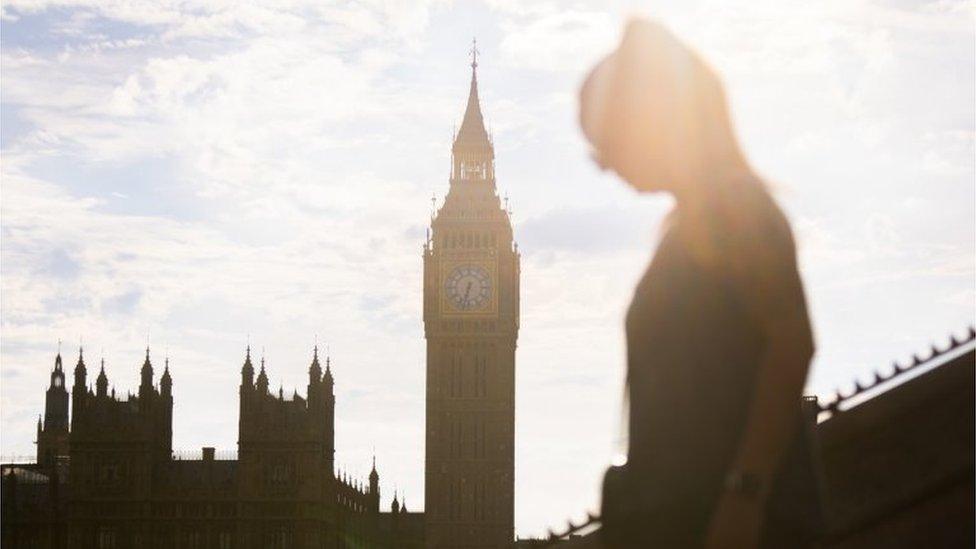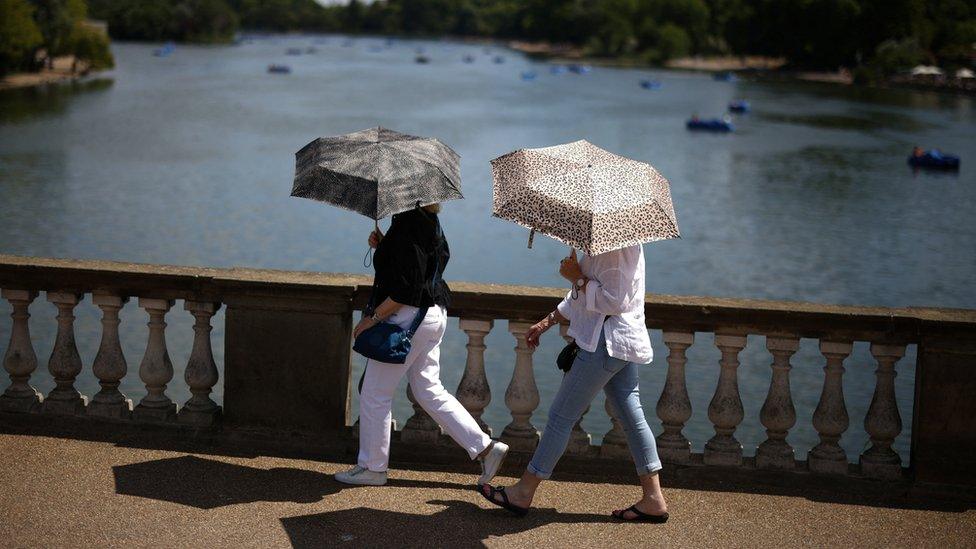NHS facing surge in demand amid extreme weather warning
- Published

The NHS is preparing for a surge in demand from people affected by rising temperatures in England and Wales.
An extreme heat weather warning applies from Sunday to Tuesday as temperatures are due to peak in excess of 35C (95F) in south, central and east England.
It means there could be a danger to life or potential serious illness.
Cabinet Office minister Kit Malthouse said the first line of defence was "behavioural change" and the key thing was to "prepare" government services.
Speaking after a meeting of the government's Cobra emergency committee, he said it was critical that people look out for "the most vulnerable groups".
Weather forecasts suggest mid to high-30s for the weekend but Mr Malthouse warned there was a "smaller possibility that we could exceed that and possibly hit 40 which would be an all-time record".
He told BBC Radio 4's World at One: "The key thing we can do is prepare the government services for what may be a surge in demand - not least the health service and elsewhere".
Temperatures in the wider area covered by the warning are more widely predicted to be as high as 35C, peaking on Tuesday, the Met Office said. Forecasters say they could be as high as 39C in parts of southern and eastern England.
People are being urged to stay hydrated, look out for vulnerable people, keep curtains closed and stay out of the sun in the middle of the day.
The world has already warmed by about 1.1C since the latter half of the 18th century, and experts predict that temperatures will keep rising unless governments make steep cuts to emissions.
The Met Office said the hot weather was caused by high pressure over the UK and hot air flowing from southern Europe.
A heatwave spreading across Europe has fuelled wildfires in Portugal, France and Spain.
Pressures are already high on NHS services, with patients in England waiting longer for ambulances.
Figures from June show that it took an average of 51 minutes for ambulances to respond to emergencies such as heart attacks and strokes - the target is 18.
Emily Shuckburgh, professor of environmental data science at the University of Cambridge, described extreme heat as a "silent killer".
More than 2,500 heat-related deaths were recorded in the summer of 2020, with the elderly especially vulnerable, she said.

People are advised to find shade and avoid exposure to the sun during the middle of the day
Caroline Abrahams, charity director at Age UK, said older people who already struggle with significant health issues are "going to find the coming heatwave a challenge".
She urged people to check on elderly relatives and friends during the high heat.
Rail firm Avanti West Coast has warned of disrupted journeys over the coming days because of the extreme weather and staff shortages.
It tweeted that services might be cancelled at short notice at the weekend, with amended timetables and extended journey times expected on Monday and Tuesday.
Network Rail said it was preparing the railway to keep passengers safe "ahead of next week's very high temperatures".
Meanwhile, teachers' leaders fear schools may have to cancel sports days to protect students and staff during the heatwave.
Mary Bousted, joint general secretary of the NEU teaching union, said: "It is extremely dangerous to take part in vigorous physical activity in extreme heat, with the risk of heat exhaustion and even heat stroke."
James Bowden, policy director for school leaders' union NAHT, also called on the government to "give urgent thought" to improving school buildings, saying poorly ventilated classrooms are "inconducive to work".
In other developments:
Runners in the Rabbit Run trail race in Bridgend county on Saturday have been advised to go slowly amid concerns about extreme heat.
The National Farmers' Union (NFU) has warned that the extreme heat and months of below average rainfall is causing concern. Richard Bramley from the NFU said the agriculture sector was "way behind" with water management and had not yet adapted to the changing climate.
Hammersmith Bridge in west London, which was closed in 2020 due to a heatwave, has been wrapped in giant pieces of foil to stop it from overheating.
Plus, animals at a wildlife park in Oxfordshire have been given frozen smoothies made from ingredients including pears and carrots to keep them cool.
Related topics
- Published13 July 2022

- Published16 June 2022


